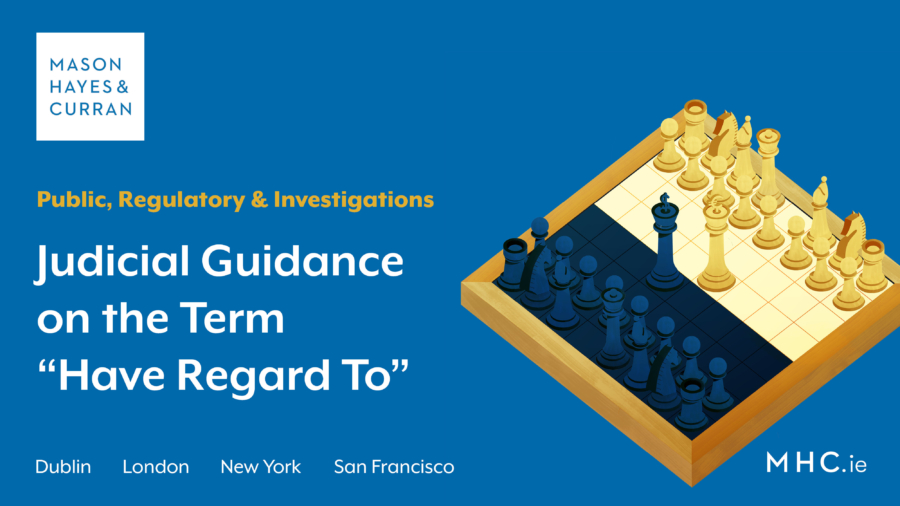Judicial Guidance on the Term “Have Regard To”

The meaning of the expression “have regard to” was recently considered in Cork County Council v Minister for Local Government, Planning and others[1]. The case concerned a direction from a Minister to Cork County Council cancelling a variation to the Cork County Development Plan for failure to have regard to particular guidelines. The Court quashed the direction from the Minister on the basis that the Minister was wrong to criticise the Council for failing to have regard to those guidelines, when in fact it had done so. We take a closer look at some of the key principles and distinctions set out in the judgment.
Relevant case law
The leading authority on the scope of the obligation to “have regard to” remains McEvoy v Meath County Council[2]. In that case, the High Court referred to an earlier Supreme Court judgment in Glencar Exploration plc v. Mayo County Council[3], in which the Supreme Court noted that where parliament intends for something to be implemented or followed in a binding or strict way with no choice, it will say so. By contrast, where parliament states that a person is to “have regard to” something, this means that they have a choice as to whether and to what extent they should implement or follow it, once they have considered that thing in the particular case in hand.
Obligation to consider
Applying the Supreme Court’s approach, the High Court in McEvoy found that the phrase created an obligation to consider something rather than to follow or slavishly adhere to that thing. In McEvoy, it was held that once the County Council had considered the particular guidelines to which it was supposed to have regard, it could not be said that it had not had regard to them. Acting contrary to them, or not reflecting them to whatever degree, or at all, was not evidence or proof that the Council had not “had regard to” them.
Breakdown of relevant principles
In the more recent High Court decision in the Cork County Council case, having looked at McEvoy and also G.K. v Minister for Justice, Equality and Law Reform[4], Judge Humphreys set out a helpful summary and detailed breakdown of the relevant principles when considering the meaning of “have regard to”. This included the following:
- Expressions like “consider”, “take into account”, and “have regard to” all mean the same thing, and this applies whether it is the State that is having regard to something, or if it is seeking to have regard had by someone else to its views.
- “Having regard” implies looking at the matter concerned, and factoring in its relevance and/or weight, if any, as those matters appear to the decision-maker.
- If the decision-maker fails to even look at the documents or matters to which they are to have regard, or if the evidence doesn't demonstrate that they have done so, then a ground for judicial review arises on the basis of a true failure to have regard.
- The determination of the decision-maker as to relevance is subject to judicial review for legality, and their determination as to weight is normally subject to review for unreasonableness only. So, if a person feels another person has failed to take account of a relevant factor, or failed to give the appropriate weight to a factor actually taken into account, the person’s challenge should not be based on an alleged failure to “have regard to” the factor. Once there is evidence that the factor has been considered, then regard will have been had to it, even if it is wrongly rejected, or given inappropriate weight. Rather, the challenge should be based on an alleged legal error in rejecting the factor or on a weight being given to the factor that was so unreasonable that no reasonable decision-maker would, or should, have given that particular weight to it.
- If a decision states that a decision-maker had regard to something, then the onus is on the person challenging that to prove otherwise by evidence.
- The use of “mandatory”, “strident”, “peremptory”, or other similar language in a document to which regard must be had doesn't elevate the duty to have regard to the document to an enhanced level, or require additional reasons to be given for the decision-maker’s decision. That would be a “self-evidently bootstrapping conceit”. Any enhanced duty has to come from a source that is external to the document being considered itself, such as from the statute that creates the duty to “have regard”, or the legal context. So, if particular guidelines, for example, to which a decision-maker is to have regard are couched in strong language of whatever type, that language cannot override or change the nature of a statutory duty to simply “have regard to” them.
- The duty to have regard to something doesn't automatically create a duty to give reasons for not giving that matter more weight. That follows from the entitlement of the decision-maker to assess the weight to be given to the various matters which they are considering or “having regard” to.
- If the provision concerned uses language such as to have “due” or “appropriate and reasonable” regard to something, then that generally connotes an additional degree of weight to be given to the matter to which regard is to be had, with a general enhancement of the level of reasons that must be given for not affording such weight.
Judge Humphreys held that the Council in this case had been incorrectly criticised by the Minister for not giving “sufficient” regard to the guidelines in issue, whereas in fact the statute only required “regard” to be had to them. Intensifiers could not simply be read into the statute by sleight of hand. Doing so would significantly change the meaning of the concept, which is that “[n]o kind of compliance is required by a have-regard obligation, merely regard”.
Conclusion
The judgment of Judge Humphreys is a welcome, clear and practical addition to the body of case law providing guidance on the meaning, effect and application of the words “have regard to”. It helpfully sheds light on precisely what it takes to comply with the obligation to have regard to something, and distinguishes that from decisions as to what relevance or weight to give to particular factors.
In short, once there is evidence that a decision-maker has considered something, then they will have “had regard to” it. There may be separate questions as to whether, having had regard to the thing, they have fallen into a legal error by rejecting a factor as irrelevant, or by giving weight to a factor to a degree that falls outside of the bounds of legal reasonableness.
For more information on the interpretation of the above principles or on the case itself, please contact a member of our Public, Regulatory & Investigations team.
The content of this article is provided for information purposes only and does not constitute legal or other advice.
[1] [2021] IEHC 683
[2] [2003] IEHC 31
[3] [2002] 1 ILRM 481
[4] [2001] IESC 205, [2002] 2 I.R. 418
Share this:



